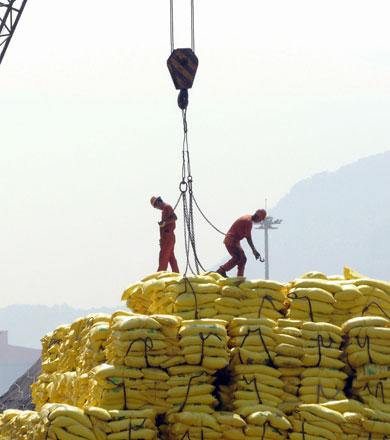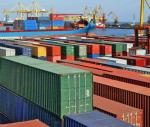You are here
China's lending push bypasses cash-starved farm sector
By Reuters - Feb 14,2015 - Last updated at Feb 14,2015

SHANGHAI — As China pulls out the stops to get more lending into its economy to bolster flagging growth, farming, a sector that employs almost a third of its 1.4 billion people, remains in desperate need of funding.
Policy makers have cut interest rates, increased lending targets and freed up banks' reserves to lend more, helping to sustain a rally in Chinese shares and a property bubble, but it is not getting through to agriculture, which produces around 9 per cent of the China's gross domestic product (GDP), though with pitiful productivity.
World Bank data showed the value added per farmworker in China was $750 in 2012, compared with around $63,000 in the United States.
Inefficient and obsolete farming techniques have also been blamed for causing major soil and water pollution and food scandals, but it needs investment to turn the sector around.
Jin Yong, a lifelong farmer in Anhui, one of China's poorest provinces, formed a corporate entity with other individual investors in an effort to improve his access to funding.
The plan is to sell organic vegetables, but the company has yet to turn a profit, and credit is part of the problem.
"We don't have rights to the land. We have things in the ground, but banks don't care. They just want evidence of ownership for collateral," he indicated.
Beijing is aware of the problem; its recently published "number one" planning document listed modernising farms as a key priority for 2015, including plans to encourage private investment and cheaper financing.
But lenders are steering clear.
The share of loans going to agriculture has declined every year since 2010, official data show. In 2014, banks lent 306.5 billion yuan ($49.1 billion) to agriculture, compared with approximately 1 trillion yuan for margin finance for use in stock speculation, and 2.8 trillion yuan for real estate.
Reform dilemma
Chinese bankers who spoke to Reuters said official calls to lend to farmers were effectively countermanded by official orders to reduce the bad debt on their books.
"When banks lend, they're not going to think, 'I wonder what direction the country is expanding in?'" said a senior loan officer at one of the big five state-owned banks. "A bank's priority is still going to be a firm's liquidity; is it good? Cash flow, is it good? Do they have the ability to repay?"
Foreign bankers told Reuters they have been approached by regulators asking them to increase lending to the sector, but they, too, are reluctant.
There is also a failure by banks to adapt to changing needs, said Cheng Enjiang, senior research fellow at Victoria University in Australia specialising in rural finance and microfinance in China.
"There has been an increase in demand for agricultural loans to larger-scale farms, but rural credit cooperatives and agricultural banks don't have feasible products tested for that," he added.
There are also political dimensions to the problem.
Agricultural analysts say self-sufficiency goals intended to minimise China's dependence on food imports have resulted in mandated production of staple grains and starches that earn far lower profit margins for farmers than fruits and meats.
Some officials also fear that increasing efficiency and profits through mechanisation would ring Chinese cities with slums full of unemployed farmers.
But policies designed to keep farmers on small, low yielding plots impedes the consolidation that could create economies of scale.
The right to buy and sell rural land is retained entirely by the local government, so not only is a farmer unable to use his land as collateral, he can't buy other people's land.
Thus Jin Yong, the aspiring organic vegetable magnate, can only rent land, and rental contracts are no use in securing bank loans.
Without major policy reforms, farming will remain a bad bet both for the farmers and the bankers.
"We don't lend to certain sectors just because the government tells us to," said a fund manager at a listed Chinese commercial bank. "We'll only lend to a company in any sector if it means we'll come out profitable."
Separately, China's top anti-corruption watchdog has targeted 26 of the biggest state-owned firms, including telecoms, energy, and manufacturing conglomerates, for inaugural inspections this year.
The visits will kick off immediately this week after lunar new year holidays, the Central Commission for Discipline Inspection (CCDI) said in a notice.
Designated conglomerates include China Telecom Group Co., China National Petroleum Corp., or PetroChina, China National Offshore Oil Corp., and China National Nuclear Corp.
"We need to sharpen the 'Sword of Damocles' hanging above those in power and use inspections to keep them in awe," the statement quoted watchdog head Wang Qishan as saying.
Other firms to be visited by antigraft investigation teams are Sinochem Group, China Ocean Shipping (Group) Co., or Cosco, China Mobile Communications Corp and Baoshan Iron & Steel Group Co.
As part of President Xi Jinping's vigorous crackdown on corruption, the anti graft body will inspect "all important backbone state-owned firms and financial institutions" this year, it said on its website.
The watchdog has brought down more than 70 senior officials at state firms in 2014, the official Xinhua News Agency pointed out on Thursday.
Last week, it accused officials at top coal producer China Shenhua Group of taking bribes and manipulating coal prices for personal benefit, according to its website.
The anti-graft watchdog also found serious violations by executives of power group China Huadian Corporation during takeovers of coal mines and in official appointments, activities that led to large losses.
Lu Haijun, a director of Bank of Beijing Co., has also been put under investigation this year as the commission widens inquiries in the finance sector.
The commission's anti-graft efforts at state firms coincide with the imminent roll-out of ambitious new guidelines to overhaul China's inefficient state sector.
One key measure, expected within weeks, will focus on controlling company insiders and avoiding losses during reforms.
Other firms targeted in the first round of inspections are China Power Investment Corp., State Nuclear Power Technology Corp., China Huaneng Group, State Grid Corp. of China, China Southern Power Grid Co.
Also named are China Nuclear Engineering Group Co., State Development & Investment Corp., Dongfang Electric Corp., China Electronics Technology Group Corp., China Electronics Corp., and China Minmetals Corp.
China State Construction Engineering Corp., China Shipbuilding Industry Corp., China National Machinery Industry Corp., China General Technology (Group) Holding Ltd., China Datang Corp., China Guodian Corp., and Wuhan Iron and Steel (Group) Co. are among the others identified.
According to state media, China's ruling Communist Party will launch a year-long probe into the incomes of military staff, following revelations of widespread graft in its armed forces.
Party leaders have described corruption as a key threat to China's military modernisation campaign, which has seen double digit increases in the army budget for more than a decade.
China's Central Military Commission, headed by President Xi Jinping, will conduct an "investigation of all military personnel", the state-run Global Times said.
The audit will be overseen by the head of the army's general logistics department Zhao Keshi, and will look into "all cash flows, receipts and expenses" to find evidence of embezzlement, said official army media according to the report.
The investigation will be "will be far reaching and may involve conflicts of interest", it cited Zhao as saying.
Xi heads the military and the Communist Party and has vowed a crackdown against endemic corruption, an issue that has long drawn widespread public anger in China.
China's People's Liberation Army (PLA) said last month it launched investigations into 16 senior officers at corps level and above in 2014.
Top Chinese military officer Gu Junshan was formally charged with corruption last year after he was exposed as owning dozens of homes, state media reported.
Officials seized "a gold boat, a gold wash basin and a gold statue of Mao Zedong" along with "crates of expensive liquor" from one of Gu's residences, reports said at the time.
Xi's campaign also led last year to the ousting of Xu Caihou, a former vice-chairman of the Central Military Commission.
But the Communist Party has not introduced reforms such as official asset declaration or independent courts and media, and critics have said that the anti-graft drive is politically motivated.
Related Articles
BEIJING — China's top graft-busting agency has lambasted the country's powerful state-owned industries as being riddled with corruption and
BEIJING — Chinese President Xi Jinping opened a critical Communist Party Congress on Wednesday with a pledge to build a "modern socialist co
BEIJING — China said the United States needs to correct its "wrong actions" for trade talks to continue after it blacklisted Huawei, a


















